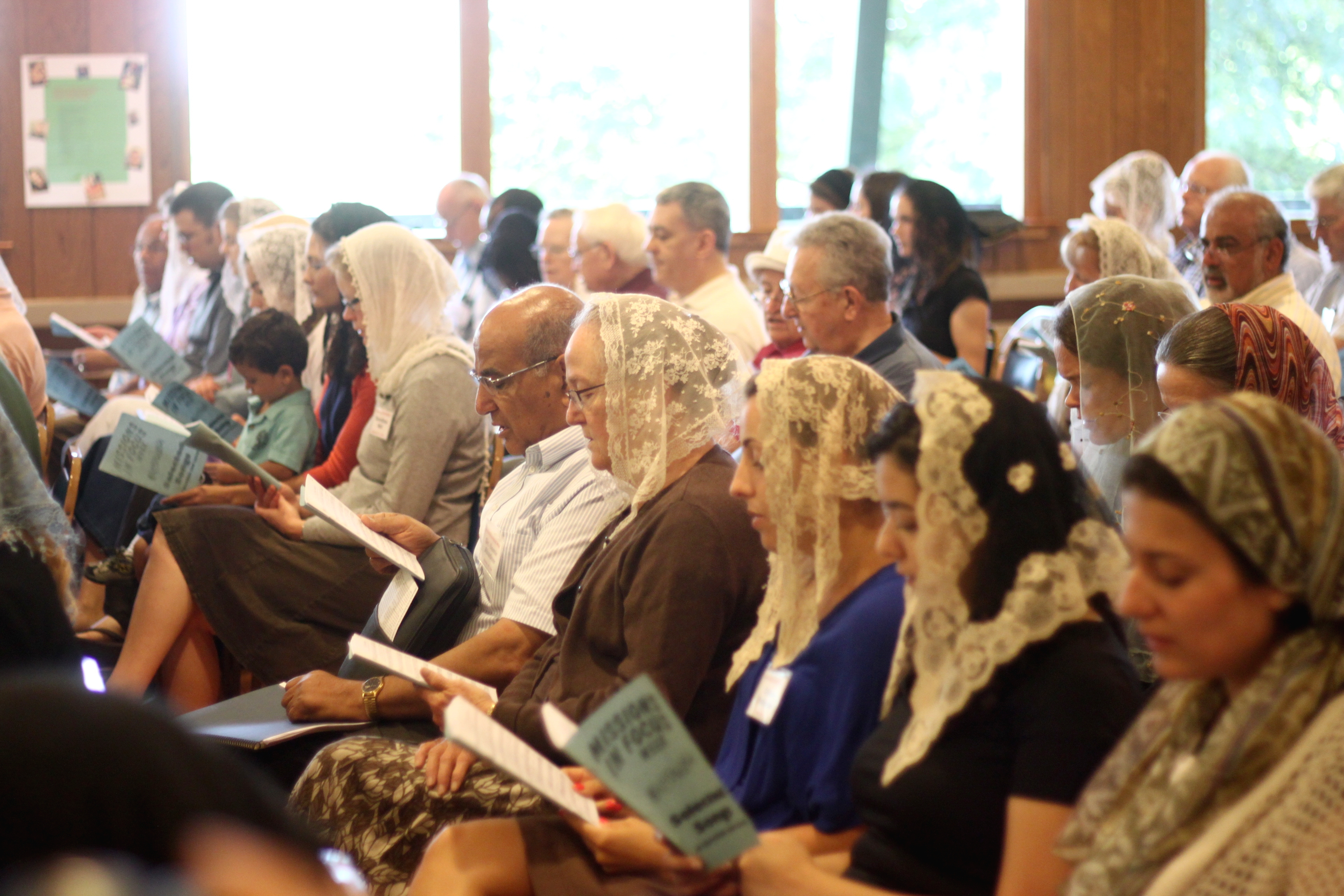Why Do We Cover Our Heads

Why do we cover our heads? First of all, who are "we?" In this case the word "we" refers to sisters in Christ—that is, those women who have trusted Jesus Christ as their Savior.
If you have never done so, please write to the address at the front of this magazine. We would love to tell you about our Lord.
Those of us who do know the Lord want to be obedient to Him. (We often fail Him but we don't want to.) A good way to start is by obeying our Lord in small things. Matthew 25 and Luke 19 suggest that the Lord Jesus will not trust us with much if we do not obey Him in little matters. Covering one's head is "little" only in the sense that it is easy to do. We have no reason to think that it is little in importance.
The answer to the question is: because we are told to do so.
Who told us? The Lord Jesus, through the apostle Paul. If you read 1 Corinthians 11, especially the first 16 verses, you will be in no doubt about this rule. Paul, writing under the inspiration of the Holy Spirit, says that we must not pray or prophesy unless we cover our heads. Brothers, on the other hand, should not cover their heads at such times.
What about prophesying? Clearly, sisters are allowed to prophesy—but not in an assembly (church) meeting nor when men are present. We must not pray aloud either, in these gatherings. See 1 Corinthians 14:34-35 and 1 Timothy 2:11-12. (The Greek words translated as "prophesy" and "prophecy" do not always mean prediction. To quote an older writer: "It is forth-telling, not foretelling.")
The rule is clear. So is the reason.
Why? Why must we wear hats or other head-coverings when we pray? It is a matter of authority. We are not in charge! Men are our head and Christ is their head.Thus when we cover our heads we show the authority of men but also that of Christ. The third verse of 1 Corinthians 11 explains this. (But you really have to read the whole chapter attentively to get the idea.)
The head covering is a symbol of authority, man's and God's. We wear it "on account of the angels" as we are told in verse 10. The angels are watching us! They are watching the Assembly—the whole group of believers, worldwide. They look for the order that they see in creation. See 1 Corinthians 4:9 and 1 Peter 1:10-12. We first read about this order in Genesis 2:21-24 and 3:16. Paul refers to it in
1 Corinthians 11:3, 8.
We cannot discuss headship, authority and head coverings without talking about long hair.
We have to have both? Yes. Just as long hair is a shame for a man, so short hair is a shame for a woman. The chapter we have been considering says so. Our hair is our glory. It must be long and it must be covered when praying. Although the hair is like a veil (verse 15), it is not the covering mentioned in verse 5. The word "also" (verse 6) confirms this.
Is this rule only for assembly gatherings or does it include private prayer? Read 1 Corinthians 11 and 1 Timothy 2. Pray about it, asking for wisdom as the apostle James advised in his book. Now, what do you think?
Isn't all this old fashioned? Yes. Or, more correctly, it is above fashion. We should be too.
The idea of women being "in subjection" (or obedient) to men is unpopular, to say the least! But true Christianity has never been popular. The world hates it. The world murdered the Lord Jesus.
I don't like anything that denigrates women. Neither do I. God honors certain women. Mary, the mother of our Lord, said that everyone would call her "blessed." She was quick, though, to give credit to "the Mighty One" who "has done to me great things."
The case of another Mary and her sister Martha is interesting. The Lord Jesus commends Mary because she listened to Him. He gives Martha a mild rebuke for being overly concerned with her household tasks. We read about it in Luke 10:38-42. Even though we are told to be diligent in our homes (Titus 2:5), we must not be distracted with cooking and cleaning. Some people think that Christianity keeps women in the kitchen while men learn doctrine. This is not in the Scriptures!
What do the Scriptures say to a sister about housework? She is told to "rule" in strictly domestic matters (1 Timothy 5:14). When I read 1 Corinthians 10:31-33, 1 and 2 Timothy, Titus, and Peter's epistles, I have the impression that we should work hard at whatever our tasks are, but only so that we can do the important task: honoring our Lord. We must care for our husbands and instruct our children in the faith; then worldly people will see how different believers' homes are.
Perhaps the ideal sister is a combination of Martha and Mary. Practical Martha appears in a different light in John 11. Both sisters are guilty of telling the Lord, in effect, that His visit is too late—but Martha's faith appears to be equal to that of her sister.
The Lord Jesus never denigrated women in general nor any in particular. The apostles didn't either. Do you remember the woman who was caught committing adultery? Have you read about Lydia and her prayer meeting? What about the woman in Samaria? Read John, chapters 4 and 8 and Acts 16.
What about single sisters? It is true that a lot of Scriptural advice is directed to those who are married. That is probably because most adults are.
Widows and single women are, however, a majority in some groups today. Their behavior before the Lord should be no different from that of married women so far as honoring Him is concerned. They, too, are happy to have long hair and head coverings showing the ultimate headship of their Lord, Whom we all honor.
It is interesting to note that all the women named in Scripture are treated as individuals. We do not even know whether some of them were married. Some examples are Martha, three of the Marys, Lydia and most of the women named in Paul's epistles.
In those days women didn't have careers, did they? Some Biblical women, such as Lydia, seemed to have earned their own living. Some, though married, had other important responsibilities; note the property buyer in Proverbs 31:16 and (a thousand years later) Priscilla in Acts 18:24-26. (See also Acts 18:1-3, 18; Romans 16:3; 1 Corinthians 16:19 and 2 Timothy 4:19.)
Priscilla must have been a busy sister. She learned much about her Lord—while making tents. She, with her husband, "unfolded the way of God more exactly" to Apollos—even though he was already "mighty in the Scriptures" as well as earnest and instructed! Priscilla also found time to have Paul as a house-guest. I wonder if she and Aquila had children.
I heard that the instruction about hair and head coverings was intended only for Christians living in Corinth in the first century. I've heard that too. The people who say this usually tell you that it had something to do with what immoral women did not wear and what virtuous women did wear. Christians who say these things usually accept almost everything else in the Corinthian epistles, even the prohibition against long hair on men! This eclectic acceptance however, sometimes excludes the advice in 1 Corinthians 14:34, 35 because someone said that, in the first century, some women were unruly, calling out to their husbands (seated apart from their wives) even during church meetings.
All we really know about apostolic times is in the Bible. Extra-Scriptural writers in the first century were rare and their extant writings are rarer still. How many people could read and write? Who could afford parchment and ink? Of those, how many even mention Christians? Of those who do, how many are reliable? Even respected historians, writing today, have very few documents other than the Bible that they can consult about first-century practices in general and fewer still of Christians in particular.
Did the apostle Paul limit his letter? Did he say it was only for the Christians of Corinth? Did he say it was just for that time? No. He said it was to the Assembly of God at Corinth with all that in every place "call on the name of our Lord Jesus Christ." That is how he opens his letter! Read 1 Corinthians 1:1-3. See also 1 Corinthians 11:16 and 14:37, 38.
So it's a matter of obedience? Yes, but it's more.
This beautiful distinction between men and women goes beyond compulsory coverings and such hackneyed questions as "How long is long?" The division of humanity into two complementary parts goes back thousands of years to the dawn of this planet when the divine Creator divided all sentient beings into male and female. Even then, at the foundation of the universe, He wanted us, the Assembly, as His bride. He is preparing us all for the day of presentation.





